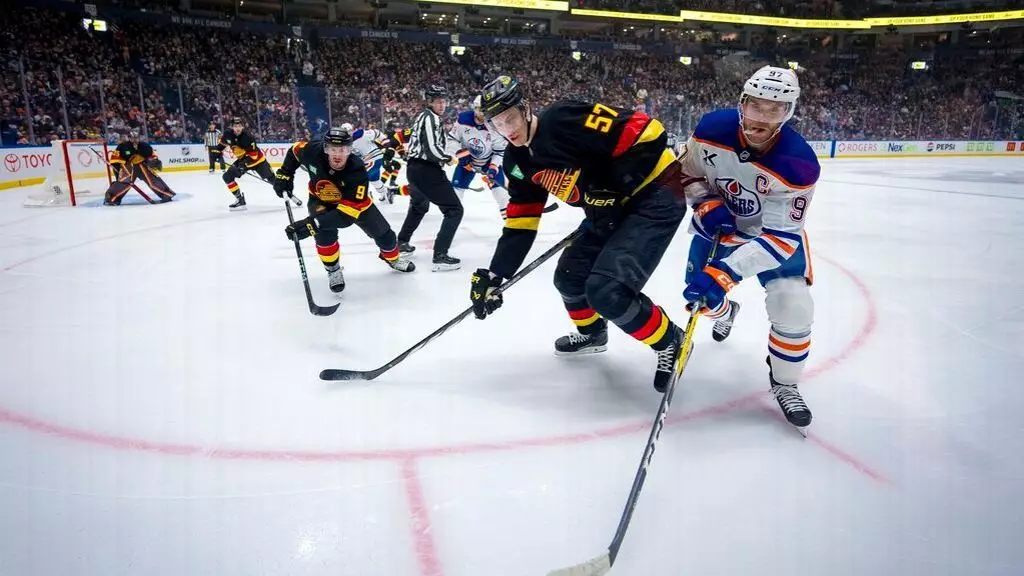In the realm of professional hockey, tensions can run high, particularly in critical matchups between rival teams. This was evident in a recent game between the Edmonton Oilers and Vancouver Canucks, where stars Connor McDavid and Tyler Myers found themselves making headlines for all the wrong reasons. Both players received three-game suspensions for delivering cross-checks to the heads of their opponents during a heated match. This unfortunate incident serves not just as a moment of disciplinary action, but also highlights the escalating need for player safety amid intense athletic competition.
A Breakdown of Events
The conflict unfolded in the third period of Saturday’s game, when both McDavid and Vancouver forward Conor Garland were entangled on the ice. With the Canucks leading 3-2 and the clock winding down, the situation became increasingly heated. After a series of exchanges, including McDavid’s frustration at being held while trying to regain his footing, he retaliated with a powerful cross-check to Garland’s head. This moment marked a significant lapse in judgment for the Oilers’ captain, who is known for his exceptional skills and remarkable achievements, including multiple MVP awards.
Simultaneously, defenseman Tyler Myers, frustrated and perhaps compelled by the energy of the game, retaliated against Oilers’ Evan Bouchard with his own cross-check to the head. This two-pronged attack led to both players receiving match penalties. The on-ice officials were right to act swiftly, as head injuries in hockey are a serious matter, often leading to long-term consequences.
This incident is particularly noteworthy for McDavid, given that this three-game suspension is the longest in his decade-long NHL career. It marks a shift for a player who, despite his aggressive style of play, has largely managed to avoid extensive disciplinary actions until now. Statistically, McDavid has been a dominant force in the NHL, currently ranking fourth in points. His explosive talent often results in him being targeted, raising questions about the responsibilities of both players and officials in maintaining fairness.
As for Myers, this suspension is not an unusual occurrence for him. Historically, he has faced disciplinary actions before, including suspensions for boarding and illegal checks. It raises a worrisome pattern that the NHL must contend with as it seeks to balance physical play with player safety.
Both players will miss critical follow-up games, including a rematch on Thursday night. These absences could significantly impact their respective teams, especially for the Oilers, whose offensive strength often funnels through the gifted playmaking of McDavid.
The NHL’s Stance on Safety
The NHL’s Department of Player Safety has been more vigilant than ever in response to incidents that risk the wellbeing of players. Their assessment noted that McDavid’s action was intentional, escalating an altercation in a manner that warranted suspension. While McDavid’s frustration on the ice is understandable, his choice to employ a dangerous move reflects a broader issue in sports regarding emotional control and the impacts of high-stakes competition.
Additionally, the department’s conclusion on Myers’ actions points to the need for continued education among players regarding safe play. The league’s focus on eliminating head injuries is commendable, yet it comes with challenges, particularly when players allow emotions to dictate their actions during games.
Both players are also facing financial repercussions from their suspensions—McDavid forfeiting over $195,000 and Myers losing around $46,000. These fines will be directed to the NHL’s Players’ Emergency Assistance Fund, signifying that the league remains committed to supporting players in need, even in the aftermath of disciplinary actions.
As superstars of the NHL, both McDavid and Myers have avenues to appeal their suspensions, a process that reinforces the league’s acknowledgment of the complexities involved in these situations. Yet, the expectations placed upon star players to not only perform but also uphold sportsmanship and safety ethics cannot be overstated. Their actions serve as a reminder to all athletes about the implications of frustration and the importance of maintaining composure within the intense arena of competitive sports.
The recent suspensions of McDavid and Myers underline not only the physical challenges inherent in ice hockey but also the psychological dimensions that players navigate. It is crucial that the NHL continues to address issues of safety and conduct, ensuring that players are held accountable without compromising the spirit of the game. As both teams move forward without their stars, they face a critical juncture that emphasizes the need for player discipline, personal growth, and a commitment to sportsmanship, elements essential for fostering a safer and more respectful hockey culture.


Leave a Reply